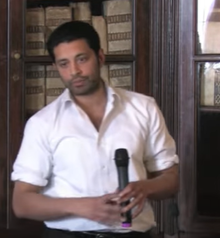
Arif Mohuiddin Ahmed MBE is the Director for Freedom of Speech and Academic Freedom of the Office for Students, following his appointment in June 2023.[1] Prior to this, Ahmed was a philosopher at the University of Cambridge, where he became a fellow of Gonville and Caius College in 2015,[2] university reader in philosophy in 2016,[3] and Nicholas Sallnow-Smith College Lecturer in 2019.[4] His research interests include decision theory and the philosophy of religion, from an atheist and libertarian point of view.[2] Ahmed studied mathematics at the University of Oxford and philosophy at the University of Sussex and Cambridge.[5]
At Cambridge he has been an advocate for the protection of freedom of speech, in reaction to the university administration's cancellation of an invitation to the politically conservative academic Jordan Peterson.[6][7][8] In 2020, Ahmed also led opposition to the University's proposed amendments to its freedom of speech policy, ultimately concluding with the rejection of the amendments.[9][10]
Ahmed was appointed Member of the Order of the British Empire (MBE) in the 2021 Birthday Honours for services to education.[11] In late 2022, the Minister for Women and Equalities, and Trade Secretary, Kemi Badenoch MP appointed Ahmed as new Commissioner to the Equality and Human Rights Commission (EHRC) Board.[12] He left the EHRC after being appointed Director for Freedom of Speech and Academic Freedom at the Office for Students (OfS) in June 2023.[1][13]